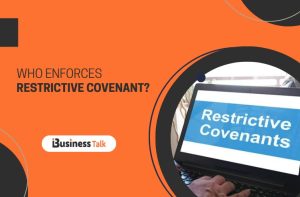Table of Contents
ToggleIn the UK, a restrictive covenant solicitor is a lawyer who specializes in advising clients on restrictive covenants in both property and employment law. A restrictive covenant solicitor can assist with the drafting, negotiating, and enforcement of restrictive covenants in real estate transactions and employment contracts. They can also advise on the legal implications of such covenants and help clients to navigate disputes that may arise. If you are an employer or employee or are buying or selling a property that is subject to restrictive covenants, a restrictive covenant solicitor can provide expert advice and help protect your interests. Here, we will discuss, what is a covenant and restrictive covenant, and the list of top 10 restrictive covenant lawyers to support you.
What is a Covenant?

A covenant refers to a legal agreement between parties, which imposes obligations or restrictions on the use of a piece of property. A covenant can be either positive, requiring the party to do something, or negative, prohibiting the party from doing something. For example, a covenant may impose an obligation to maintain the appearance of a building, or restrict the use of a property for certain purposes.
Covenants can be binding on future owners of a property and are typically recorded in the title deeds for the property. A covenant for employment refers to a legal agreement between an employer and an employee, which outlines the obligations and responsibilities of both parties during the employment relationship.
A covenant for employment can include various terms such as the duties of the employee, the duration of the employment, the amount of compensation, confidentiality, non-compete clauses, and others. These covenants are enforceable by the courts and can have an impact on the employee’s ability to work for competitors or start a new business after the employment ends.
It’s important for both the employer and the employee to understand the terms of a covenant for employment, as it can have significant legal implications for both parties.
What is a Deed of Covenant?
A Deed of Covenant is a legal agreement that creates obligations and restrictions between two or more parties. In the context of property law, a Deed of Covenant is a binding settlement agreement between a landowner and a beneficiary. The landowner agrees to restrict the use of their property in some way, such as by contributing to a community or maintaining certain amenities.
In the context of employment law, a Deed of Covenant is an agreement or employment contract between an employer and an employee, which imposes obligations on the employee after the employment relationship has ended.
For example, a Deed of Covenant may include a non-compete clause restricting the employee from working for a competitor or a confidentiality clause requiring the employee to keep certain information confidential. Both types of Deed of Covenant are legally binding and can have significant consequences for the parties involved.
What is a Restrictive Covenant?
A restrictive covenant in the UK is a legal agreement that restricts the use or enjoyment of property or limits an individual’s actions in some way.
In the context of property law, a restrictive covenant is a binding agreement between a landowner and a beneficiary in which the landowner restricts the use of their property in some way.
For example, a restrictive covenant may prohibit the construction of certain types of buildings on the land or limit land use for certain purposes. These covenants are usually recorded in the title deeds for the property and are binding on future owners.
In the context of employment law, a restrictive covenant is an agreement between an employer and an employee, which restricts the actions of the employee after the employment relationship has ended.
For example, a restrictive covenant may include a non-compete clause, which restricts the employee from working for a competitor, or a confidentiality clause, which requires the employee to keep certain information confidential. These types of restrictive covenants are enforceable by the courts and can have a significant impact on an individual’s career prospects.
How to Get Around Restrictive Covenants?
Getting around restrictive covenants can be difficult, as these agreements are legally binding and enforceable by the courts. However, there are several steps that you can take if you wish to challenge a restrictive covenant.
Review the terms of the covenant: Before attempting to challenge a restrictive covenant, it’s important to understand the terms and conditions of the agreement fully. This will help you determine whether there are any grounds for challenging it.
Assess the reasonableness of the covenant: Restrictive covenants can only be enforceable if they are reasonable. Factors that are considered when determining reasonableness include the length of time the restriction lasts, the geographical area covered by the restriction, and the type of restriction imposed.
Seek legal advice: Consult with a solicitor who specializes in restrictive covenants to discuss your options and the best approach for challenging the covenant.
Negotiate with the other party: If the restrictive covenant is considered reasonable, you may be able to negotiate with the other party to have it modified or waived.
Seek a court order: If you cannot reach an agreement with the other party, you may need to seek a court order to declare the restrictive covenant unenforceable.
Who Enforces Restrictive Covenants?

The courts enforce restrictive covenants. The enforcement process begins when the beneficiary of the covenant (the party entitled to enforce the restriction) brings legal action against the person who has breached the covenant (the covenantor).
The court will consider the terms of the restrictive covenant and the circumstances of the breach of contract to determine whether the covenant is enforceable. If the court finds that the restrictive covenant is enforceable, it may grant an injunction to prevent the covenantor from continuing to breach the restriction. If the covenantor continues to breach the restriction, they may be held in contempt of court, which can result in fines or imprisonment.
How Much Does It Cost to Remove a Restrictive Covenant?
The cost of removing a restrictive covenant in the UK can vary depending on several factors, including the complexity of the restriction, the parties involved, and the legal process required to have the covenant removed.
In the context of property law, the cost of removing a restrictive covenant can range from several hundred to several thousand pounds. This includes the cost of obtaining legal advice, negotiating with the beneficiary of the covenant, and any court fees that may be required. The exact cost will depend on the specific circumstances of each case.
In the context of employment law, the cost of removing a restrictive covenant will depend on the nature of the restriction, the length of time it lasts, and the parties involved. In some cases, it may be possible to negotiate with the employer to remove the restrictive covenant, which may not incur significant costs.
However, in other cases, it may be necessary to seek a court order to have the restriction declared unenforceable, which can be a complex and time-consuming process. In this scenario, the costs will depend on the legal fees incurred, any court fees that may be required, and the time and resources required to litigate the matter.
Restrictive Covenants Solicitors – Top 10 Covenant Lawyers in UK
A restrictive covenants lawyer can help you understand the terms and conditions of the covenant and advise you on the enforceability and potential impact of the restriction. If the restrictive covenant is considered reasonable, a restrictive covenant solicitor can help you negotiate with the other party to modify or waive it.
If you cannot reach an agreement with the other party, a restrictive covenants solicitor can help you seek a court order to declare the restrictive covenant unenforceable. Restrictive covenants lawyers can help you understand your rights and obligations under the covenant and advise you on the best course of action to protect your interests.
If necessary, a restrictive covenants solicitor can represent you in court and provide legal representation throughout the legal process. Having a restrictive covenants solicitor on your side can help protect your rights and interests and increase your chances of successfully challenging the covenant.
Ian Hurst – Duncan Lewis Solicitors

Ian Hurst is a solicitor at Duncan Lewis Solicitors, a UK-based law firm that provides legal services in a wide range of areas. As a solicitor at Duncan Lewis, Mr. Hurst may specialize in advising clients on legal matters related to property law, employment law, immigration law, and more.
If you are affected by a restrictive covenant in your contract with another party, Duncan Lewis can help you understand your rights and options under the agreement. The team at Duncan Lewis will provide Legal Advice & Representation throughout the entire process – from negotiating modifications or waivers to taking any necessary steps to have the restriction declared unenforceable in court.
Image – source
Anthea Dave – Duncan Lewis Solicitors

Anthea Dave is a solicitor at Duncan Lewis Solicitors and may specialize in advising clients on legal matters related to property law, employment law, immigration law, business litigation, and more.
Ms. Dave may be able to offer Legal Advice & Representation throughout the entire procedure as a solicitor at Duncan Lewis, from negotiating modifications or waivers to taking whatever actions are required to have the restriction declared unenforceable in court.
Image – source
Thomas Lewis – WBW

Thomas Lewis is one of the leading restrictive covenant solicitors in the UK. The firm has extensive experience in drafting and enforcing restrictive covenants and offers a range of services to attain business benefits of all sizes. From legal advice to representation in court, the Thomas Lewis team is dedicated to helping businesses protect their interests and achieve the best possible outcome.
The firm is known for its thoroughness, thorough understanding of legal issues, and ability to provide compelling arguments on behalf of its clients in court. Whether drafting a restrictive covenant agreement or enforcing a restrictive covenant already in place, Thomas Lewis ensures that small businesses receive the support they need to protect their interests and succeed in their business endeavours.
The Thomas Lewis team is passionate about helping businesses succeed and grow and offers free consultations to help guide businesses through their legal needs. If you are looking for a reliable and knowledgeable restrictive covenant solicitor, be sure to contact the Thomas Lewis professional team today!
Image – source
Amy Jackson – WBW

Amy Jackson is a leading restrictive covenant solicitor in the UK, with extensive experience in drafting restrictive covenants for commercial and property development projects. Her experience covers a wide range of areas, including property development, commercial property, and leaseholds.
Amy Jackson’s team of lawyers at Jackson Legal can help you draft restrictive covenants that protect your investment and ensure that the use of the property remains consistent with the terms of the lease or contract. In addition to her legal expertise, Amy Jackson is a member of various professional organizations, including the Law Society and the Chartered Institute of Land Surveyors. She is also an accredited mediator who has represented clients in court proceedings. If you are looking for a lawyer to help you with restrictive covenants for your business or real estate project, Amy Jackson is an excellent choice.
Image – source
David Baybut – Stephensons

David Baybut is a leading restrictive covenant solicitor in the UK. He has extensive experience drafting and enforcing restrictive covenants in a wide range of commercial properties, including retail stores, warehouses, manufacturing facilities, and office buildings.
His experience and expertise make him one of the best options for handling any legal challenges you may face with restrictive covenants.
They provide comprehensive legal services for businesses with restrictive covenants in place, including drafting and litigation support services. They also have a range of resources to help businesses navigate the often-complex process of enforcing a restrictive covenant. If you are facing challenges with restrictive covenants in your business, contact David Baybut at Stephensons for help navigating the legal system and protecting your intellectual property rights.
Image – source
Chris Graves – Stephensons

Chris Graves is a leading restrictive covenant solicitor in the UK. The firm has a strong record of providing quality legal advice to businesses and homeowners. Chris Graves is experienced in drafting restrictive covenants that protect both property and business interests.
The lawyers at Stephensons are experts in a range of legal areas, so they can offer you expert counsel, no matter your covenant problem. If you are looking for a reliable and effective solicitor, contact Chris Graves – Stephensons today for a free consultation.
Image – source
Amanda Ambler – Chadwick Lawrence

Amanda Ambler is a property law solicitor with Chadwick Lawrence, a firm that has decades of experience representing real estate investors and developers in the UK. Amanda has represented many high-profile clients, including prominent universities and corporations.
She is known for her expertise in negotiating restrictive covenants, which help protect property interests when the owner does not have the complete rights to use or manage the property. Amanda’s legal expertise and dedication to her work make her a valuable resource for property owners looking to safeguard their investments.
Chadwick Lawrence is one of the most experienced restrictive covenant lawyers in the UK, and has represented numerous property owners in negotiating restrictive covenants on their properties. This can help property owners protect their investment if they do not have full control of the property. Chadwick Lawrence attorneys are experts at navigating complex legal and business issues related to restrictive covenants or like financial department issues and can help property owners protect their investment interests.
Image – source
Dan Hirst – Chadwick Lawrence

Dan Hirst is a leading restrictive covenant lawyer in the UK. He has over 20 years of experience in this field and has helped countless businesses protect their interests. Chadwick Lawrence is another skilled restrictive covenant lawyer who specializes in property law. Together, these two professionals can provide you with the legal guidance you need to protect your business.
Whether you are a startup trying to protect your intellectual property or an established business looking to safeguard your operating agreement, they have the expertise and experience to help you achieve your goals. If you’re facing legal challenges related to restrictive covenants, reach out to a competent attorney for help protecting your business interests.
Image – source
Fergal Dowling – Irwin Mitchell

Fergal Dowling is an experienced solicitor with a strong background in property law. As legal counsel to Irwin Mitchell, he has years of experience helping businesses and individuals protect their interests in restrictive covenants. He is also well-versed in the business and contractual negotiations that are necessary for securing such agreements

Mark Oakley is a solicitor with more than 20 years’ experience in the legal field. He has largely focused on property law, which includes extensive knowledge of restrictive covenants. As legal counsel to Judge Priestley, he can provide you with the expert guidance you need to protect your business interests.
Whether you are a startup trying to negotiate protective agreements or an established private limited company looking to ensure compliance with existing restrictions, Mark Oakley can help guide you through the process. Contact him today for advice and support related to restrictive covenants.
Image – source
Conclusion
In conclusion, restrictive covenants are legally binding agreements that can limit the use of property or restrict an individual’s actions in some way. These covenants can be found in both property and employment contexts, and they can impact the rights and interests of the parties involved. If you are affected by a restrictive covenant, it may be possible to have it modified or waived through negotiation, or declared unenforceable through the legal process. Seeking professional legal advice from a restrictive covenants solicitor is recommended to ensure that your rights and interests are protected.
FAQ – Restrictive Covenants Solicitors
Restrictive covenants are typically handled by solicitors. This is because they have the expertise and experience to help businesses secure protective agreements that meet their specific needs.
Yes, restrictive covenants can be removed from a property. To do this, you’ll need to consult with a lawyer who is experienced in the removal of restrictive covenants from properties. A lawyer may also be necessary to file a petition with the court system in order to have the restrictive covenants removed. Make sure you are getting the best legal advice possible before taking any steps towards removing restrictive covenants from your property.
Restrictive covenants are legally binding agreements between two or more parties. The purpose of a restrictive covenant is to protect the interests of one or more parties. Typically, they will protect the property interests of the parties involved. A restrictive covenant can be in the form of an agreement, deed, or trust.
Restrictive covenants are commonly used in the business world. They are particularly useful when two or more parties have a conflict of interest that could arise if their property was sold or shared without their agreement. If you are considering entering into a restrictive covenant agreement, it is important to consult with a reputable solicitor.
Restrictive covenants are legal agreements that restrict an individual’s ability to sell or lease their property. Courts commonly enforce restrictive covenants in order to protect the rights of the parties involved.
There are a number of factors that courts will consider when determining whether or not to enforce a restrictive covenant. These factors can include the terms of the covenant, the relationship between the parties involved, and the public interest.
A restrictive covenant lawyer can help you draft and/or negotiate a restrictive covenant that is likely to be enforced in court.
Yes, you can sell a house with a restrictive covenant. In most cases, a restrictive covenant is a legal agreement between the seller and buyer that restricts the use or sale of a property.
A restrictive covenant can be in the form of an endorsement to the purchase contract, an addendum to the purchase contract, or a deed restriction. Generally, a restrictive covenant will prohibit the buyer from using or selling the property for a certain period of time.
If you are selling a house with a restrictive covenant, it is important to consult with a Covenant lawyer to make sure the agreement is enforceable.
Disclaimer
The images were used in this blog are not owned by iBusiness Talk, the copyrights of those images are belongs to the respective owners.
What is your reaction?
Categories
Latest Posts






